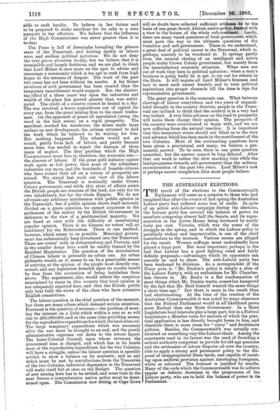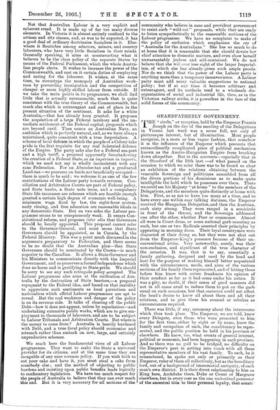THE AUSTRALIAN ELECTIONS. T HE result of the elections to the
Commonwealth' Parliament will come as a surprise to those who had imagined that after the events of last spring the Australian' Labour party bad suffered some loss of credit. In spite of an active anti-Labour campaign during the elections, the Labour party has secured the balance of power, its members composing almost half the Senate, and its repre- sentation in the Lower House being increased by nearly forty per cent. Victoria, which was the scene of the struggle in the spring, and in which the Labour policy is peculiarly violent and impracticable, is one of the chief contributors to the increase. Various causes are alleged for the result. Woman suffrage must undoubtedly have' played a large part. But most important, perhaps, is the fact that Labour has a good fighting creed and fairly definite proposals,—advantages which its opponents can scarcely be said to share. The anti-Labour party has been weakened by divisions. As a correspondent of the Times puts it, " Mr. Deakin's policy is simply a. slice of the Labour Party's, with an enthusiasm for Mr. Chamber- lain thrown in. Mr. Reid s is a flat condemnation of most things which Mr. Deakin wants, somewhat hampered by the fact that Mr. Reid himself wanted the same things a short time ago." But there is more in the result than bad electioneering. At the time of the creation of the' Australian Commonwealth it was noted by many observers that the Federal Parliament would in all likelihood prove more Radical than any State Government. In a State Legislature local interests play a large part, but in a Federal Legislature a Member votes for matters of which the prac- tical application is less directly brought home to him, and therefore there is more room for " viewy" and doctrinaire policies. Besides, the Commonwealth was actually con- structed on something very like Labour ideals. Among the arguments used in its favour was the need of founding a central authority competent to provide for old-age pensions and the settlement of labour disputes all over the country,. able to apply a strong and permanent policy to the dis- posal of unappropriated State lands, and capable- of insist-. ing upon uniform provision against interloping foreigners, white or coloured. The forecast is justified by results. Many of the ends which the Commonwealth was to achieve appear as definite doctrines in the programme of the• Labour party, who are to hold the balance •of power 'in Parliament. . . . . • . • . 1 Not that Australian Labour is a very explicit and coherent creed. It is made up of far too many diverse elements. In Victoria it is almost entirely confined to the artisan and city classes, and, as was to be expected, it has a good deal of ordinary doctrinaire Socialism in it. Else- where it flourishes among selectors, miners, and country labourers, who have very little Socialism in their minds. Generally speaking, it aims at counteracting what it believes to be the class policy of the separate States by means of the Federal Parliament, which the whole Austra- lian people elects. It wishes to increase the power of the Commonwealth, and cast on it certain duties of employing and caring for the labourer. It wishes, at the same time, to stereotype the monopoly of Australian work- men by preventing immigration and the competition of cheaper or more highly skilled labour from outside. If we take the main points in its programme, we shall find little that is actually unreasonable, much that is quite consistent with the true theory of the Commonwealth, but much also which is extravagant and out of place in the present situation of the continent. It asks for a white Australia,—that has already been granted. It proposes the acquisition of a. large Federal territory and the im- mediate settlement of the Federal capital, proposals which are beyond cavil. Then comes an Australian Navy, an ambition which is perfectly natural, and, as we have always maintained, quite consistent with a true Imperialism. A scheme of local defence in which the people of a Colony take pride is the first requisite for any real federated defence of the Empire. The party asks also for a Federal sea-port and a high tariff, a proposal apparently foreshadowing the creation of a Federal State, as an imperium in imperio, which we need. not say is wholly inconsistent with any sane Federation. For an Absentee-tax and a graduated Land-tax—we presume on lands not beneficially occupied— there is much to be said ' • we welcome it as one of the few contributions of the Labour party towards revenue. Con- ciliation and Arbitration Courts are part of Federal policy, and State banks, a State note issue, and a compulsory State life insurance are schemes which are feasible enough granted a certain high degree of economic well-being. A minimum wage fixed by law, the eight-hour system, early closing, and free education are reasonable ideals in any democratic State. But on two sides the Labour pro- gramme seems to us conspicuously weak. It essays Con- stitutional reform, and proposes inter alia that Governors should be locally appointed. This proposal cannot refer to the Governor-General, and must mean that State Governors should be appointed, as in Canada, by the Pederal Ministry. This was a point much discussed in the arguments preparatory to Federation, and there seems to be no doubt that the Australian plan—that State Governors should be nominated by the Crown—is much superior to the Canadian. It allows a State Governor and his Ministers to communicate directly with the Imperial Government, and so preserves a formal independence which does no harm and is gratifying to State pride. We should be sorry to see any such retrogade policy accepted. The Labour programme also aims at the unification of Aus- tralia by the destruction of State barriers,—a proposal repugnant to the Federal idea, and based on that inability to appreciate such sentiments as local patriotism and nationalism which official Labour programmes are apt to reveal. But the real weakness and danger of the policy is on its revenue side. It talks of clearing off the public Debt—how it does not appear, unless by repudiation—and undertaking extensive public works, which are to give em- ployment to thousands of labourers, and are to be subject to Labour Tribunals and Arbitration Courts. But where is the money to come from ? Australia is heavily burdened with Debt, and a true fiscal policy should economise and retrench rather than embark on new, large, and certainly unproductive schemes.
We reach here the fundamental vices of all Labour programmes. They want to make the State a universal provider for its citizens, and at the same time they are incapable of any sane revenue policy. If you wish both to eat your cake and have it, you must steal a cake from somebody else ; and the method of objecting to public burdens and insisting upon public benefits leads logically to confiscatory legislation. We have too much respect for the people of Australia to believe that they can ever reach this end. But it is very necessary for all sections of the community who believe in sane and provident government to resist such " wild-cat " proposals, while they are ready to listen sympathetically to the reasonable sections of the Labour programme. We have no complaint to make of the policy of exclusion which emphasises the cry of "Australia for the Australians." She has so much to do at home that it is reasonable that she should devote her chief attention to domestic matters, and even show herself unwarrantably jealous and self-contained. We do not believe that she will ever lose sight of the larger Imperial- ism, of which she has already given such ample proofs: Nor do we think that the power of the Labour party is anything more than a temporary inconvenience. A Labour party must add many valuable suggestions to national policy; but if at any time it becomes arbitrary and extravagant, and its methods tend to a wholesale dis- organisation of social and industrial life, then, as in the Victorian railway strike, it is powerless in the face of the! solid forces of the community.







































 Previous page
Previous page